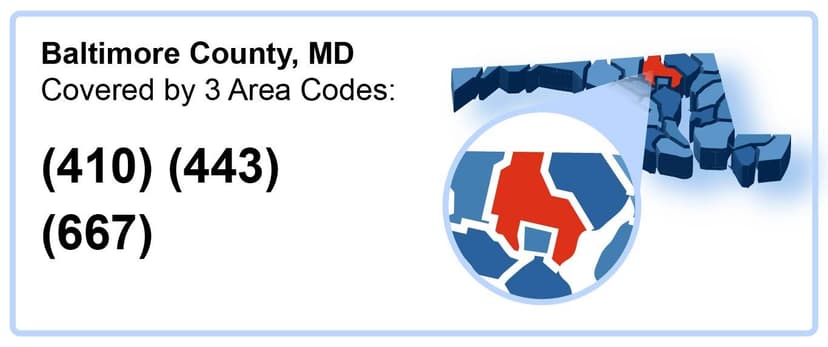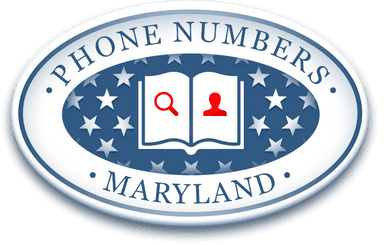What are Baltimore County Area Codes?

Area codes are the block of three numeric digits at the beginning of North American phone numbers. They identify the various numbering plan areas (NPAs) instituted by the North American Numbering Plan (NANP). The NANP divides regional service territories under its purview into NPAs to simplify making long-distance telephone calls. The Maryland Public Service Commission administers area codes in Baltimore County.
Three area codes serve all of Baltimore County and nearby locations. These are:
Area Code 410
Area code 410 is a telephone area code in the NANP that serves Baltimore County. It also covers the eastern half of the State of Maryland. It was created in a split from area code 301 in 1991. Under this area code, Baltimore County locations include Arbutus, Catonsville, Cockeysville, Essex, Middle River, Nottingham, Owings Mill, Parkville, Pikesville, Randallstown, Reisterstown, Rosedale, and Towson.
Area Code 443
Area code 443 is a telephone area code on the NANP that overlays the 410 NPA. It became active in 1997.
Area Code 667
Area code 667 is the second telephone overlay code in the NANP for the 410 NPA. It became active in 2012.
What are the Best Cell Phone Plans in Baltimore County?
Wireless telephony services have surpassed landlines as the predominant form of telecommunication in the State of Maryland. This was established by a 2018 survey carried out by the National Center for Health Statistics. The survey estimated that among adults (over 18) in the households in the state, 39.4% relied on wireless-only telephony services. About 3% relied on landlines only. For children (under 18), about 49.1% relied on wireless-only services, while less than 1% used only landlines for their telephony services.
Cell phone service is excellent in Maryland. All four major carriers (AT&T, Verizon, T-Mobile, and Sprint) provide 90% coverage of territories in the state, and several MVNOs are available as well. Mobile Virtual Network Operators (MVNOs) are smaller operators that offer telephony services using the major operators’ network infrastructure. Service coverage can, however, be tricky in deep valleys and remote natural areas.
VoIP (Voice over Internet Protocol) is a group of technologies that uses IP networks, typically the internet, to deliver telephony services. VoIP offers a broad range of telephone services that are more efficient and less expensive than traditional telephone services. Various companies provide VoIP services to Baltimore County residents for both business and personal use.
What are Baltimore County Phone Scams?
These are actions using telephony services that deceptively obtain money and personal information from Baltimore County residents. Using phone search tools to perform suspicious phone number lookups can help retrieve information on phone scammers’ identities. Numerous agencies provide consumer protection assistance to Baltimore County residents. These agencies include;
- Baltimore County Police Department
- Baltimore County State’s Attorney
- Maryland Attorney General
- National Consumer League
- Federal Trade Commission
Residents who have been victims of scams can contact any of these agencies for assistance. Common scams committed in Baltimore County include:
What are Coronavirus Tracing Scams?
Authorities warn of persons who have taken advantage of the coronavirus pandemic to defraud unsuspecting individuals. Scammers posing as contact tracers contact residents and inform them that persons they have been in contact with have tested positive for COVID-19. The scammers collect personal information from their victims, such as social security numbers, banking information, and even upfront payments for tests and medications.
Authentic contact tracers from local health departments do contact residents as part of coronavirus tracing protocols. However, these health workers will only ask for names, addresses, health information, persons you came in contact with, and places visited. If you receive a phone call supposedly from a health worker who requests confidential information or upfront payment, it is a scam. End the call immediately and report it. Reverse phone number searches can retrieve information about the phone numbers used to make such calls.
What are Law Enforcement Impersonation Scams?
These scams are widespread across Baltimore County and the State of Maryland. Scammers call residents impersonating officers of the Baltimore County Police Department (BCoPD) or Baltimore County Sheriff (BCSO) deputies. The callers routinely spoof Caller IDs to display these agencies’ official phone numbers. These scammers inform their targets of a range of offenses, such as missed jury duty or court summons, unpaid tickets, and pending criminal cases. They then claim arrest warrants are out for the targets, but these can be cleared if they make payments. The callers always insist on payments by prepaid debit cards, wire transfers, and other such unconventional channels. In some instances, they arrange to meet up with the victims to collect payments in cash.
County residents are advised that neither the BCoPD nor the BCSO calls to inform about active warrants. They will also not request payments over the phone and will never insist on payment via unofficial channels. Phone number lookups can identify when calls are from illegitimate sources. If unknown callers claiming to be law enforcement agents request your personal information or attempt to coerce payments, hang up immediately. Contact your local BCoPD precinct or the BCSO on (410) 887-3131 to verify the callers’ claims.
What are Sex Offender Extortion Scams?
These scams target sex offenders registered in Baltimore County. Scammers call persons listed on the Sex Offender Registry, pretending to be law enforcement officers. The callers tell the targets that they missed scheduled court dates or were negligent in fulfilling the legal requirements associated with being on the registry. They then tell the targets that they must make payments or face arrest. The scammers may even provide call-back numbers that reach voicemails set up to sound like law enforcement agencies to authenticate their claims. They insist on payment by reloadable debit cards, gift cards, or ask for their victims’ bank details.
The BCPD, or any county law enforcement agency, will never solicit payments or personal information from residents to help them avoid arrest or prosecution. Calls from unknown persons purporting to be law enforcement and requesting payments, in such unconventional forms as gift cards, are scams. Victims of these scams should file reports at their local BCoPD precincts. A reverse phone search can authenticate if calls are legitimately from the BCoPD or local law enforcement agencies.
What are Grand Jury Scams?
Scammers call or leave voice messages for residents claiming to be from the Baltimore County Sheriff’s Office (BCSO). The callers inform them that bench warrants were issued for failure to attend grand jury indictment hearings. The callers will insist that the court summons were sent to the targets, and the delivery receipts were signed. If pressed, they may provide scant information about the court cases, but never give details. The targets have to make payments using bond vouchers or prepaid cards to have the warrants rescinded. The callers arrange to meet the victims to collect the payments. If the targets appear noncompliant, the callers typically get aggressive to intimidate them.
The BCSO will not proactively contact residents about outstanding warrants. The BCSO will also never solicit payment over the phone or insist on payment via such irregular channels. Persons who receive these types of calls should hang up immediately and report it to their local police precinct. If you are unsure about the matter, contact the BCSO on (410) 887-3131 and make direct inquiries. Reverse phone number lookup applications can identify if such calls are legitimately from the BCSO.
What are Robocalls and Spam Calls?
A robocall is a phone call automated to deliver the same pre-recorded message to multiple recipients in a short amount of time. Developed to serve the needs of organizations such as political campaigns and marketers, robocalls have been co-opted by scammers for nefarious purposes. Consumers are used to robocalls from legitimate organizations and are less vigilant if they answer them. This ambivalence and the ability to deliver messages directly and anonymously to multiple recipients make robocalls attractive to scammers. When dealing with robocalls, your best options are:
- Add your phone number to the National Do Not Call Registry. This Registry exempts listed phone numbers from receiving robocalls and spam calls unless allowed by law. Spam calls received after doing this should be treated as scam calls.
- Report any illegal robocall numbers to the FTC online or by calling 1 (888) 382-1222.
- End the call once you identify it is a robocall. Disregard the voice prompts as these lead to more messages and mark your number for more spam calls.
- Use call-blocking features offered in smartphones and provided by carriers to block the numbers used for unwanted robocalls and spam calls.
- Use phone number lookup free services to identify robocall numbers and block them.
The FTC website informs consumers about blocking unwanted calls on any platform.
How to Spot and Report Baltimore County Phone Scams?
Being knowledgeable about their tactics and on the lookout for tell-tale signs are the best means of spotting scammers. Scammers target anyone and routinely modify their tactics to steal money and information from unsuspecting residents. Staying informed about their methods will help you spot them before they can do any damage. The following are indicators that a call from an unknown person is a scam:
- The caller claims to represent a legitimate organization but makes repeated requests for your personal and financial information. A legitimate organization will not ask for your personal information on an unsolicited phone call.
- The caller insists on payments via prepaid reloadable debit cards, gift cards, wire transfers, and other unconventional methods. Scammers favor these payment methods because it is difficult to trace and retrieve payments once received.
- The caller informs you of a prize or winning but asks for advance payments before receiving it.
- The caller presents attractive business offers or investment opportunities and rushes you to commit. They dissuade you from seeking another opinion and insist on an immediate response by claiming the offer is time-sensitive.
- The caller claims to be law enforcement but uses intimidatory tactics to obtain your compliance. A legitimate law enforcement officer does not use threats over the phone for any reason.
Online applications that perform suspicious phone number lookups by name, number, and address are available for free or for nominal fees. Use these services to answer questions like “who called?” and “who is this number registered to?”
Victims of phone scams can seek assistance from the following agencies:
Baltimore County Police Department (BCoPD) - The BCoPD is the primary law enforcement agency in Baltimore County. Residents can file reports on scams at their local precincts or call the Financial Crimes Unit on (410) 887-2190.
Baltimore County State’s Attorney - The State’s Attorney of Baltimore County prosecutes criminals and provides effective advocacy for victims of crimes in the county. Residents can contact the State’s Attorney Office on (410) 887-6600. Alternatively, visit the Office at 401 Bosley Avenue, Room 511, Towson, MD 21204.
Maryland Attorney General - The Consumer Protection Division of the Attorney General’s Office assists with consumer issues and receives complaints about scams and deceptive practices. Residents can file complaints online, by email, and by calling (410) 528-8662.
National Consumer League (NCL) - The NCL is a private non-profit group that advocates for consumer protection from fraudulent activities. The Fraud Center is an NCL initiative that provides consumers with information and resources to combat scams.
Federal Trade Commission (FTC )- The FTC is the federal authority that protects residents from deceptive and fraudulent practices. The National Do Not Call Registry was established by the FTC to protect residents from unwanted calls. Residents can file complaints about illegal robocalls and fraudulent acts online or by calling 1 (888) 382-1222.
